国际商务英语重要知识点识记
- 格式:docx
- 大小:194.44 KB
- 文档页数:45
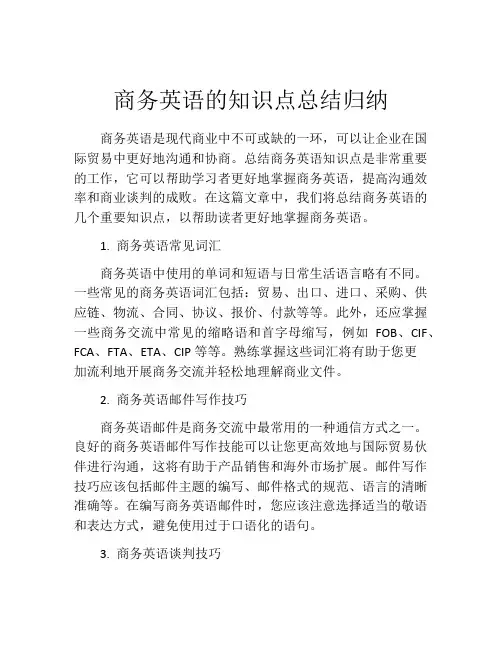
商务英语的知识点总结归纳商务英语是现代商业中不可或缺的一环,可以让企业在国际贸易中更好地沟通和协商。
总结商务英语知识点是非常重要的工作,它可以帮助学习者更好地掌握商务英语,提高沟通效率和商业谈判的成败。
在这篇文章中,我们将总结商务英语的几个重要知识点,以帮助读者更好地掌握商务英语。
1. 商务英语常见词汇商务英语中使用的单词和短语与日常生活语言略有不同。
一些常见的商务英语词汇包括:贸易、出口、进口、采购、供应链、物流、合同、协议、报价、付款等等。
此外,还应掌握一些商务交流中常见的缩略语和首字母缩写,例如FOB、CIF、FCA、FTA、ETA、CIP等等。
熟练掌握这些词汇将有助于您更加流利地开展商务交流并轻松地理解商业文件。
2. 商务英语邮件写作技巧商务英语邮件是商务交流中最常用的一种通信方式之一。
良好的商务英语邮件写作技能可以让您更高效地与国际贸易伙伴进行沟通,这将有助于产品销售和海外市场扩展。
邮件写作技巧应该包括邮件主题的编写、邮件格式的规范、语言的清晰准确等。
在编写商务英语邮件时,您应该注意选择适当的敬语和表达方式,避免使用过于口语化的语句。
3. 商务英语谈判技巧商务英语谈判是商业交易中最重要的一环。
良好的商务英语谈判技巧可以让您在谈判中更有自信,并更好地达成协议。
商务英语谈判的技巧包括聆听技巧、沟通技巧、提问技巧、协商技巧等等。
在谈判中,您应掌握恰当的语气,并准备足够丰富的词汇来表述自己的需求和愿望。
4. 商务英语电话沟通技能在商业交易中,电话沟通是必不可少的方式之一。
良好的商务英语电话沟通技能可以让您更好地与合作伙伴沟通,提高销售率和客户满意度。
电话沟通的技能包括正确的招呼、礼貌用语、听取并理解对方意见等。
如果您的商务英语口语不够流利,可以在多与母语为英语人士进行交流,以提高自己的口语水平,在电话沟通中更自然和得心应手。
5. 商务英语文化差异商业谈判不仅仅在语言上存在差异,还在文化上存在不同。
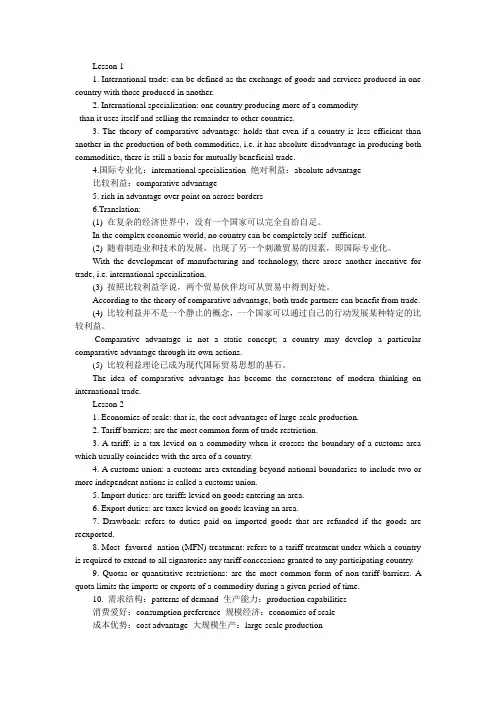
Lesson 11. International trade: can be defined as the exchange of goods and services produced in one country with those produced in another.2. International specialization: one country producing more of a commoditythan it uses itself and selling the remainder to other countries.3. The theory of comparative advantage: holds that even if a country is less efficient than another in the production of both commodities, i.e. it has absolute disadvantage in producing both commodities, there is still a basis for mutually beneficial trade.4.国际专业化:international specialization 绝对利益:absolute advantage比较利益:comparative advantage5. rich in advantage over point on across borders6.Translation:(1) 在复杂的经济世界中,没有一个国家可以完全自给自足。
In the complex economic world, no country can be completely self- sufficient.(2) 随着制造业和技术的发展,出现了另一个刺激贸易的因素,即国际专业化。
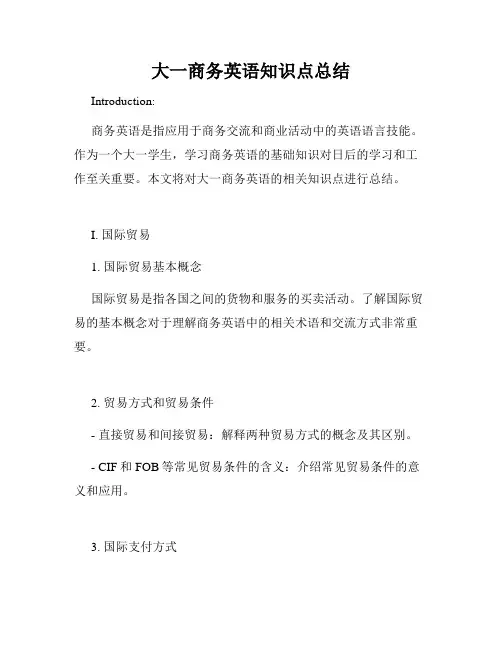
大一商务英语知识点总结Introduction:商务英语是指应用于商务交流和商业活动中的英语语言技能。
作为一个大一学生,学习商务英语的基础知识对日后的学习和工作至关重要。
本文将对大一商务英语的相关知识点进行总结。
I. 国际贸易1. 国际贸易基本概念国际贸易是指各国之间的货物和服务的买卖活动。
了解国际贸易的基本概念对于理解商务英语中的相关术语和交流方式非常重要。
2. 贸易方式和贸易条件- 直接贸易和间接贸易:解释两种贸易方式的概念及其区别。
- CIF和FOB等常见贸易条件的含义:介绍常见贸易条件的意义和应用。
3. 国际支付方式- L/C(信用证)和D/P(付款交单):解释两种常见的国际支付方式的定义和应用场景。
II. 商务信函写作1. 商务信函格式商务英语中的商务信函通常包括信头、称呼、正文、结束语和签名等部分。
介绍商务信函的标准格式和各部分的书写要求。
2. 商务信函常用句型- 开头部分:引言、自我介绍和目的陈述等。
- 主体部分:要点阐述、安排会议或商谈时间等。
- 结尾部分:表示感谢、表达希望进一步合作等。
III. 商务会议和谈判1. 商务会议准备- 规划议程:制定会议议程并明确会议目标。
- 材料准备:准备好与会议相关的文件、报告和资料等。
2. 商务会议礼仪- 会议室礼仪:介绍商务会议中的行为规范和注意事项。
- 会议用语:常用商务会议英语表达和掌握技巧。
3. 商务谈判技巧- 谈判策略:了解不同的谈判策略和技巧。
- 求同存异:平衡双方利益并达成双赢的谈判结果。
IV. 商务演示和口语表达1. 商务演示技巧- 制作PPT:介绍如何制作专业的商务演示文稿。
- 演讲技巧:掌握演讲技巧和有效的语言表达方法。
2. 商务口语表达- 电话沟通技巧:提供商务电话沟通的常用表达和技巧。
- 社交场合用语:掌握商务社交中的常用表达和礼仪。
Conclusion:以上所述是大一商务英语的相关知识点总结。
通过学习这些基础知识,我们可以更好地理解和应用商务英语,为日后的学习和工作奠定坚实的基础。
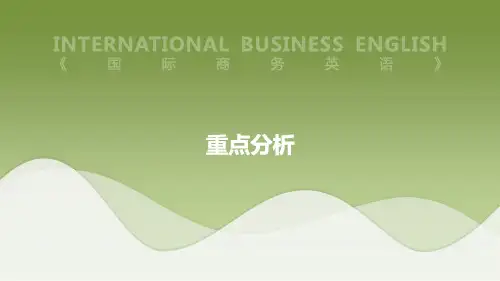
学习目标1、Income Level and the World Market2、Regional Economic Integration3、Economic GlobalizationGNP and GDPPer capita income and per capita GDPHigh-income, middle income and low-income countriesStandards for classificationRepresentative countriesTriad and QuadUnited StatesWestern EuropeJapanCanadaOther important markets for ChinaTrade Terms1.GNP国民生产总值: Gross national Product. The market value of goods and services produced by the property and labor owned by the residents of an economy.Trade Terms2.GDP国内生产总值: Gross Domestic Product. The market value of all goods and services produced within the geographic area of an economy.Trade Terms3.National income国民收入4.Per capita income人均收入Trade Terms5.Per capita GDP人均国内生产总值: It is calculated by dividing its total GDP by its population, which reveals the average income level of consumers.Trade Terms6.PPP购买力平价: Purchasing power parity7.Consumerism消费主义8.Income distribution收入分布: The proportions of its rich, middle income and poor people.Trade Terms9.Infrastructure基础设施10.Staple goods大路货11.Invoice (开)发票12.Creditor country债权国Trade Terms13. OECD经合组织,经济合作与开发组织:Organization for Economic Cooperationand Development.14. The Commonwealth of IndependentStates 独联体,独立国家联合体Trade Terms15. ASEAN 东盟,东南亚国家联盟: Associationof Southeast Asian Nationals.16. NIEs(亚洲四小虎): Newly IndustrializedEconomies17. Factors of production生产要素Trade TermsGNP and GDP are two important concepts used to indicate a country’s totalincome. The difference between them isthat the former focuses on ownership ofthe factors of production while the latterconcentrates on the country whereproduction takes place.Trade TermsIn assessing the potential of a country as a market, people often look at per capita income since it provides clues about the purchasing power of its residents..Trade TermsCountries of the world are divided by the World Bank into three categories of high-income, middle-income and low-income economies.Trade TermsChina with a per capita income of over $1100 is a middle-income country though it was a low-income country just a few years ago.Trade TermsAs far as China is concerned, other markets we should pay particular attention to are those around us: the Four Tigers, the ASEAN countries, Russia, etc. These countries with very promising market potential and can offer good business opportunities to China.Regional Economic Integration-Business Knowledge(1)Major objectives of regional integration(2)Four levels of regional economic integrationA. Free trade areaB. Customs unionC. Common marketD. Economic unionRegional Economic Integration-Business Knowledge(3)European Union (EU)(4)Asia-Pacific Economic Cooperation (APEC)(5)Organization of Petroleum Exporting Countries (OPEC)Trade Terms1. Economic integration经济一体化2. Free trade area自由贸易区: The members remove barriers to trade among themselves while still adopts each own external policyTrade Terms3. Customs union关税同盟: The members remove barriers to trade among themselves and adopt the same external policy4. Tariff rates关税税率Trade Terms5. Settlement结算,结账6. NAFTA北美自由贸易协定: North American Free Trade AgreementTrade Terms7. Common market 共同市场: The members remove barriers not only to trade but also to factors of production and adopt the same external policy.8. Banknotes circulation 货币流通Trade Terms9. Cartel 卡塔尔10.APEC亚太经合组织,亚洲太平洋经济合作组织: Asia Pacific Economic CooperationTrade Terms11.OPEC石油输出国组织: Organization of Petroleum Exporting Countries12.European Commission 欧盟委员会13.Council of ministers 部长理事会14.Dual-Ministerial Meeting 双部长会议Trade Terms15. Quota Restrictions配额限制16. Economic Union 经济同盟: The members remove barriers not only to trade but also to factors of production, adopt the same external policy and harmonize their taxation, government expenditure, industry policies and use the same currency.Trade Terms17. EU欧盟,欧洲联盟: European Union18. EC欧共体,欧洲共同体: European Community19. Benelux荷比卢(比利时、荷兰和卢森堡三国):Belgium, Netherlands, LuxemburgTrade Terms20. Mercousur 南方共同市场: Southern Cone Customs Union21. ECSC欧洲煤钢共同体: European Coal and Steel CommunityTrade Terms22. EEC欧洲经济共同体: European Economic Community23. EURATOM欧洲原子能共同体,欧洲原子能联营: European Atomic Energy CommunityTrade Terms24. SOM高官会议: Senior Officials Meeting25. TILF贸易投资便利化自由化: Trade and investment liberation and facilitationTrade Terms26. ECOTECH经济技术合作: Economic and technical cooperation27. Political entity 政治实体Trade Terms28. Sovereign state 主权国家29. Multi-polarization 多极化Trade Terms30. Sub-committee 分委员会31. Territory economies 区域经济体Trade Terms32. Pacific Rim 环太平洋圈33. Informal Meeting of Economic Leaders 领导人非正式会议Trade TermsThe past decades witnessed increasingly growing importance of regional economic integration.Trade TermsThe most notable free trade area is the North American Free Trade Agreement (NAFTA), the largest free market formed by the United States, Canada and Mexico in 1991.Trade TermsThe members of an Economic Union are required not only to harmonize their taxation, government expenditure, industry polices, etc., but also use the same currency.Trade TermsThe European Commission is one of the governing organs of the European Union. It is the body that puts proposals to the Council of Minister for decision and sees that the members carry out their duties under the treaty.Trade TermsAPEC was set up at the Ministerial Meeting held in the Australian capital Canberra attended by 12 members of Australia, the United States, Canada, Japan, Republic of Korea, New Zealand and six ASEAN countries.Economic Globalization-Business Knowledge(1) Economic globalization as an objective trendA. Basic featureB. Advantages and negative impactsEconomic Globalization-Business Knowledge(2) Multinational corporationsA. Organization- parent and affiliatesB. Characteristicsa. Enormous in sizeb. Wide geographical spreadc. Longevity and rapid growthEconomic Globalization-Business KnowledgeC. Need, goals and rolesa. Profitb. Securityc. As vehicles for cross-border transfer resourcesEconomic Globalization-Business KnowledgeD. Four typesa. Multi-domestic corporationb. Global corporationc. Transnational corporationd. World companyTrade Terms1. Share holders 股东2. Economic globalization 经济全球化3. Board of directors 董事会4. Inputs 投入Trade Terms5. Economic environment 经济环境6. Parent MNC headquarter 跨国公司母公司,总部7. Affiliate MNC子公司,分支机构,附属机构8. Branch company 分公司Trade Terms9. Subsidiary company 子公司10.Day-to-day running 日常管理Trade Terms11.MNC跨国公司: Multinational corporation, are made up of vast numbers of foreign subsidiaries, companies in which over 50 percent is owned by the parent company.Trade Terms12.Home county 母国: The country where the headquarter of the investor is located.13.Host country 东道国: The host country is a foreign country where the investor operates.Trade Terms14.MNE跨国企业: Multinational enterprise: A typical multinational enterprise shall be defined as a business organization which owns (whether wholly or partly), controls and manages assets, often including productive resources, in more than one country, through its member companies incorporated separately in each of these countries. Each member company is known as a multinational corporation.Trade Terms15.Economies of scale 规模经济16. Increase and growth 数量的增多和规模的增大17. Revenue adjusted for inflation(除去通货膨胀后的)实际收入。
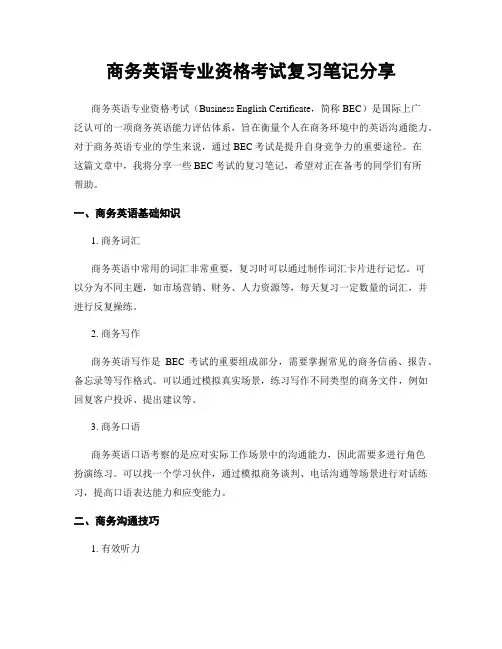
商务英语专业资格考试复习笔记分享商务英语专业资格考试(Business English Certificate,简称BEC)是国际上广泛认可的一项商务英语能力评估体系,旨在衡量个人在商务环境中的英语沟通能力。
对于商务英语专业的学生来说,通过BEC考试是提升自身竞争力的重要途径。
在这篇文章中,我将分享一些BEC考试的复习笔记,希望对正在备考的同学们有所帮助。
一、商务英语基础知识1. 商务词汇商务英语中常用的词汇非常重要,复习时可以通过制作词汇卡片进行记忆。
可以分为不同主题,如市场营销、财务、人力资源等,每天复习一定数量的词汇,并进行反复操练。
2. 商务写作商务英语写作是BEC考试的重要组成部分,需要掌握常见的商务信函、报告、备忘录等写作格式。
可以通过模拟真实场景,练习写作不同类型的商务文件,例如回复客户投诉、提出建议等。
3. 商务口语商务英语口语考察的是应对实际工作场景中的沟通能力,因此需要多进行角色扮演练习。
可以找一个学习伙伴,通过模拟商务谈判、电话沟通等场景进行对话练习,提高口语表达能力和应变能力。
二、商务沟通技巧1. 有效听力商务场景中的听力理解能力非常重要,需要能够听懂各种商务会议、电话交流等场景中的内容。
可以通过多听商务英语教材中的录音,同时注意提高听力速度和理解能力。
2. 跨文化沟通商务英语考试中也会考察跨文化沟通的能力,因此需要了解不同国家和地区的商务礼仪和文化习惯。
可以通过阅读相关书籍、观看纪录片等方式,了解不同文化之间的差异,提高应对跨文化沟通的能力。
3. 有效演讲商务英语考试中的演讲部分需要展示自己的表达能力和演讲技巧。
可以通过参加演讲培训班或者加入演讲俱乐部,提高自己的演讲能力和自信心。
三、备考技巧1. 制定合理的复习计划在备考BEC考试时,需要制定合理的复习计划,将复习内容分解为小目标,并合理安排每天的学习时间。
可以根据自己的实际情况,制定每天的学习计划,并坚持执行。
2. 多做模拟题BEC考试的题型比较固定,可以通过做模拟题来熟悉题型和提高解题能力。
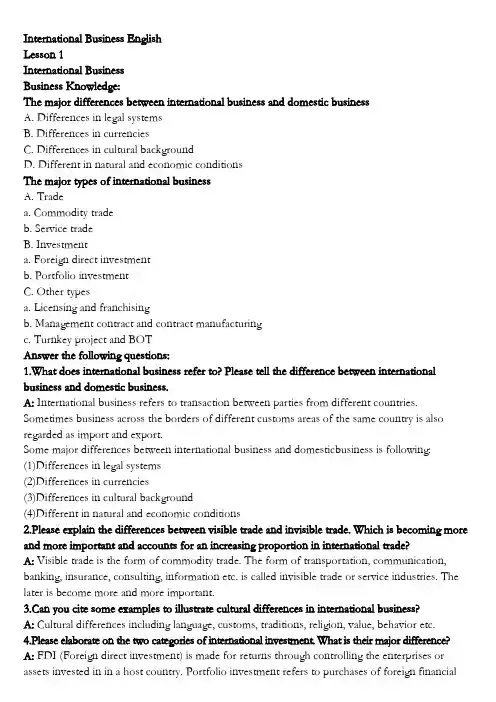
International Business EnglishLesson 1International BusinessBusiness Knowledge:The major differences between international business and domestic businessA. Differences in legal systemsB. Differences in currenciesC. Differences in cultural backgroundD.DifferentinnaturalandeconomicconditionsThe major types of international businessA. Trademodity tradeb.Service tradeB. Investmenta.Foreign direct investmentb. Portfolio investmentC. Other typesa.Licensing and franchisingb.Management contract and contract manufacturingc. Turnkey project and BOTAnswer the following questions:1.Whatdoesinternationalbusinessreferto?Pleasetellthedifferencebetweeninternationalbusinessanddo mestic business.A:Internationalbusinessreferstotransactionbetweenpartiesfromdifferentcountries.Sometimes businessacrossthebordersofdifferentcustomsareasofthesamecountryis alsoregardedasimportandexport.Some major differences between international business and domesticbusiness is following:(1)Differences in legal systems(2)Differences in currencies(3)Differences in cultural background(4)Different in natural and economic conditions2.Pleaseexplainthedifferencesbetweenvisibletradeandinvisibletrade.Whichisbecomingmoreandmore important andaccounts for anincreasingproportionininternationaltrade?A:Visibletradeistheformofcommoditytrade.Theformoftransportation,communication,banking,insur ance,consulting,informationetc.iscalledinvisibletradeorserviceindustries.Thelater is becomemore andmoreimportant.3.Canyoucitesomeexamplestoillustrateculturaldifferencesininternationalbusiness?A:Culturaldifferencesincludinglanguage,customs,traditions,religion,value,behavioretc.4.Please elaborate on the two categories of international investment. What is their major difference?A:FDI(Foreigndirectinvestment)ismadeforreturnsthroughcontrollingtheenterprisesorassetsinvestedi ninahostcountry.Portfolioinvestmentreferstopurchasesof foreignfinancialassetsfora purposeotherth ancontrolling.Suchfinancialassetsmaybe stocks,bonds orcertificatesofdeposit.5.Whatislicensing?Whydo firmssometimes choose it as a means ofenteringaforeign market?A:Inlicensing,afirmleasestherighttouseitsintellectualpropertytoafirminanothercountry.Theychooselic ensingbecausetheydonothavetomakecashpaymentstostatbusiness,andcansimplyreceiveincomeinthef ormofroyalty.Besides,they can benefit fromlocationaladvantagesofforeignoperationwithoutanyobligationsinownershipormanagement.The useoflicensingisparticularlyencouragedby highcustomsdutyandnon-tariffbarriersonthe partofthe hos t country.6.What is franchising? How is it different from licensing?A:Underfranchising,franchiseeisallowedtooperateinthenameofanother,franchiserwhoprovidesthe formerwithtrademarks,brandnames,logosandoperatingtechniq uesforroyalty.Incomparisonwiththerelationbetweenthelicenserandthelicensee,thefranchiserhasmore controloverand providesmoresupport for the franchisee.7.What is a management contract? Under what conditions is it most applicable?A:Underamanagementcontract,onecompanyoffersmanagerialorotherspecializedservicestoanotherwi thinaparticularperiodforaflatpaymentorapercentageoftherelevantbusinessvolume.Whenagovernmen tforbidsforeignownershipincertainindustriesitconsiderstobeofstrategic importance but lacks the expertise for operation, management contracts maybe a practical choice enabling a foreign company to operate in the industry without owning the assets.8.What is an international turnkey project? In what way is its variant BOT different from it?A:Foraninternationalturnkeyproject,afirmsignsacontractwithaforeignpurchaserandundertakesallthed esigning,contractingandfacilityequippingbeforehandingitovertothelatterupon completion.ForaBOT project, a firm operates a facility for a period of time after building it up before finally transferring it to a foreign company. Making profit from operating the project for aperiodisthemajordifferencebetweenBOTandthecommonturnkeyprojectTranslate the following sentences into English:1.国际贸易一般指不同国家的当事人进行的交易,它涉及到许多因素,因而比国内贸易要复杂得多。
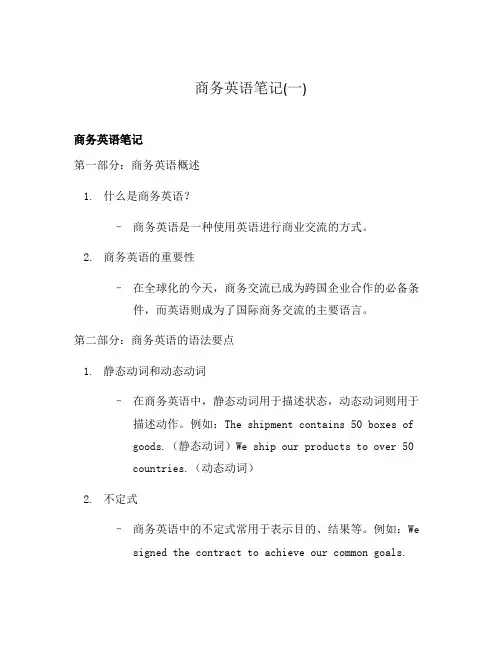
商务英语笔记(一)商务英语笔记第一部分:商务英语概述1.什么是商务英语?–商务英语是一种使用英语进行商业交流的方式。
2.商务英语的重要性–在全球化的今天,商务交流已成为跨国企业合作的必备条件,而英语则成为了国际商务交流的主要语言。
第二部分:商务英语的语法要点1.静态动词和动态动词–在商务英语中,静态动词用于描述状态,动态动词则用于描述动作。
例如:The shipment contains 50 boxes ofgoods.(静态动词)We ship our products to over 50countries.(动态动词)2.不定式–商务英语中的不定式常用于表示目的、结果等。
例如:We signed the contract to achieve our common goals.第三部分:商务英语的常用词汇和表达方式1.商业词汇–汇票:draft–账单:invoice–订单:order2.商务常用表达–感谢来信:Thank you for your letter/email.–我们收到了你方的订单:We have received your order.–请尽快确认这份合同:Please confirm this contract as soon as possible.第四部分:商务英语的写作技巧1.清晰简洁–商务英语中的文章需要简洁明了,语言简单易懂,避免使用过于复杂的词汇和句式。
2.遵循礼仪原则–商务英语需要注意礼仪原则,例如在信件中要使用适当的称呼和结束语,尊重对方的文化背景。
结语商务英语在国际贸易中扮演着重要的角色。
通过学习商务英语的语法要点、常用词汇和表达方式以及写作技巧,我们可以更好地进行商业交流,促进商业合作的发展。
第五部分:商务英语的听说技巧1.提高听力水平–商务英语中常用的词汇和表达方式需要通过大量的听力练习来掌握。
可以通过听商业节目、观看商业视频等方式提高听力水平。
2.提高口语水平–在商务英语中,口语表达显得尤为重要。
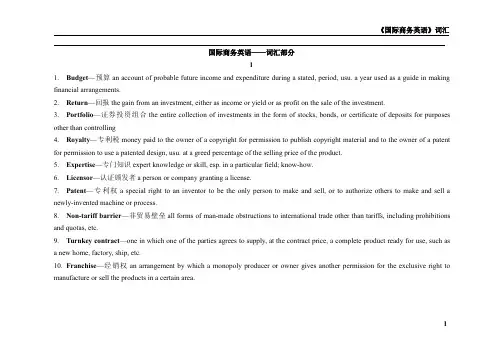
国际商务英语——词汇部分11.Budget—预算an account of probable future income and expenditure during a stated,period,usu.a year used as a guide in making financial arrangements.2.Return—回报the gain from an investment,either as income or yield or as profit on the sale of the investment.3.Portfolio—证券投资组合the entire collection of investments in the form of stocks,bonds,or certificate of deposits for purposes other than controlling4.Royalty—专利税money paid to the owner of a copyright for permission to publish copyright material and to the owner of a patent for permission to use a patented design,usu.at a greed percentage of the selling price of the product.5.Expertise—专门知识expert knowledge or skill,esp.in a particular field;know-how.6.Licensor—认证颁发者a person or company granting a license.7.Patent—专利权a special right to an inventor to be the only person to make and sell,or to authorize others to make and sell a newly-invented machine or process.8.Non-tariff barrier—非贸易壁垒all forms of man-made obstructions to international trade other than tariffs,including prohibitions and quotas,etc.9.Turnkey contract—one in which one of the parties agrees to supply,at the contract price,a complete product ready for use,such asa new home,factory,ship,etc.10.Franchise—经销权an arrangement by which a monopoly producer or owner gives another permission for the exclusive right to manufacture or sell the products in a certain area.21.Purchasing power—购买力of persons,the public,having the money to buy goods and services.2.Assess—估价to judge an amount or value.3.spur—to urge or encourage4.average—of an ordinary,common or usual kind in quality or amount5.Productive—producing in high efficiency or in large quantity6.tap—to take what is needed from,to exploit7.Infrastructure—large-scale public services,such as water and power supplies,road,rail and radio communications,etc.needed to support economic activity,esp.industry,trade and commerce.8.recipient—a person or an organization etc.that receives something9.consumerism—considerable desire to make purchase for consumption10.PPP—purchasing power parity31liberalization—of trade,the act of government in lifting controls over imports and exports2integration—combining into the whole3tariff—tax levied by the customs4barriers to trade—any action by a government to limit or prevent the free flow of goods in and out of its country.5mobility—capacity that can move or be moved easily and quickly from place to place.6detour—绕道route that avoids a blocked road;deviation7banknote—纸币printed paper money issued by a bank,usu.the country’s central bank.8erode—侵蚀wear away,eat into9envisage—picture(an event,action,etc)in the mind as a future possibility;imagine10veto—否决权right to reject or forbid something41affiliate—a subsidiary company controlled by another2assets—total resources of a business,as cash,accounts receivable,real estates etc.3world company—a multinational whose national identity has been blurred4facilities—something designed,built or installed to serve a specific function or perform a particular service 5revenue—收益the total annual income of state6decentralize—使分权distribute the administrative powers over a less concentrated area7nationalize—to bring under the control or ownership of a nation\8welfare—well-being9framework—organization structure10input—something that is put in business operation51service—something done to help or benefit others2abundant—plentiful,more than enough3specialization—to restrict one’s economic activities to certain particular fields4primary commodities—those commodities not processed,or only slightly processed,usually farm produce or raw materials 5incentive—that which incites,rouses or encourages a person6alternative—that may be had,used etc.in place of sth.else7intuitive—relating to the power of the immediate understanding of something without reasoning or study8efficient—producing a desired or satisfactory result;able to perform duties well9endowment—a natural gift or ability10exploit—to develop the use of,make the best use of61drawback—退税duties paid on imported goods that are refunded when re-exported2highlight—to make prominent;to draw special attention3bulky—taking a lot of space,and often of a shape difficult to handle4perishable—easily to go bad5tariff—duties imposed on goods imported and exported6specific duties—duties levied on the basis of quantity,weight,size etc.of the goods7ad valorem duties—duties levied on the basis of the price of the goods8unilaterally—单方面地done by one side or party only9maritime—connected with the sea or navigation10remittance—汇款money sent by post71law suit—legal prosecution2dispute—argument or controversy3remedy—method of putting right something that is wrong4amendment—修正changes made to something5Incoterms—a set of international rules for the interpretation of trade terms6present—submit7premise—a tract of land including its buildings8heading—category9classification—the arrangement of things by groups10carriage—the price or cost of transportation81business line—goods dealt in by a company2voluntary offer—an offer made on the initiative of the offerer3contract—an agreement setting forth the binding obligations of the relevant parties 4indispensable—absolutely necessary5contract proper—the main body of a contract6contracting parties—signatories of an agreement7force majeure—[不可抗力]social or natural calamities that take place beyond the control of a contracting party8purchase contract—a contract made by the buyer9firm offer—an offer whose terms and conditions are binding on the offer10offeree—受要约人the party to whom an offer is made91.popular—liked and admired2.hyperinflation—恶性通货膨胀soaring of prices beyond control3.inflation—通货膨胀rise in prices brought about by the excess demand,expansion of money supply,credit etc.4.protectionism—贸易保护主义the theory of the system of developing home countries through duties and other means imposed oncompetitive imports5.bilateral—双边的of two sides6.bundling—捆绑式销售the exchange of goods or services are tied together7.expertise—expert skill or knowledge8.creditors—a person to whom one owns money9.transferable—possible to be handed over10.verified data—authentic materials101.debtor—a person who owes money2.default—fail to carry out an obligation3.dubious—doubtful,uncertain,questionable4.draft—an unconditional order to someone to pay a sum of money5.remittance—the sending of money or the money sent6.fluctuation—irregular movement of(prices,exchange rates etc.)7.drawer—the person who issues a draft,usually the exporter8.sound—financially satisfactory9.ban—prohibit,forbid10.drawee—付款人the person to whom a draft is drawn111.credit-worthiness—being believed or accepted by others as reliable in making payment2.substantial—large,great,considerable3.constitute—make up;amount to;form4.applicant of an L/C—the importer that goes to a bank for the establishment of an L/C5.beneficiary—受益人the company that can make use of an L/C to get paid for its export6.discrepancy—difference;absence of agreement7.confirming bank—the bank that adds its own commitment to an L/C8.bill of exchange—written order drawn by the beneficiary on the bank for the purpose of payment9.underlying—forming the basis of10.reimburse—退款pay back to somebody for the expenses he has spent121.clean credit—a credit that does not require shipping documents for payment2.cancel—not to do something that has been arranged or decided upon3.leading bank—major bank,most important bank4.impeccable—faultless5.insolvent—无力偿还的unable to pay debts6.sight credit—a credit by which payment can be made upon presentation of the draft7.maturity—becoming due8.after sight—after presentation of draft9.middleman—中间商trader through whom goods pass between the producer and the consumer10.sustain—suffer131.documentation—the presentation and use of shipping documents2.consignee—the party in the bill of lading to whom the goods are shipped3.shipping marks—what is printed on the outer packing of goods as symbol for identification in the course of transportation4.discrepancy—absence of agreement5.liability—what one is responsible for according to law6.apparent—according to appearance;seeming7.insurance policy—a document used for covering possible risks8.discount—amount of money that may be taken off the full amount9.title—right to the possession of a position or property10.invoice—a document for the general description of the goods and the price141alternative—a choice from two or more possibilities.2modes—different forms of transportation3fundamental—very important4ownership—legal right of possession5intermediate products—semi-manufactures6commercial intercourse—business dealings between individuals or firms7unload—getting goods off a carrier8package—combination of related parts or elements accepted or rejected as a single unit 9distribution—the marketing,transporting,merchandising,and selling of any item10destination—the terminal to which goods are sent151insured—a person covered by an insurance policy2premium—the amount paid by an insured for coverage under the contract3potential loss—loss which is possible to incur4viability—ability to succeed in operation5claim—a payment demanded in accordance with an insurance policy6margin—amount above what is estimated as necessary7underwriter—a person who carries on insurance as a business8consumption—the using up of goods and services having an exchangeable advantage 9compensation—something given or received as an equivalent for loss10pooling—a combination of funds formed for common advantage161field—a sphere of activity2incidence—occurrence3multi-modal transportation—transport that combines road,rail,sea and air4diminish—the right to collect from an endorser a payment of loss5indemnity—compensation for loss6subrogate—to substitute a claim against one person for a claim against another person 7legal action—an action taken against someone in accordance with the law8leader—an insurer who is well-known in a particular class of business9deposit—money paid as part payment that is owned10compulsory—that must be done171peg—to keep fixed or unchanged2redeem—to repay or pay off,esp.loan stock,debentures and preference shares or stock3settlement—the act of paying a bill,debt,charge,etc4exchange rate—the price at which one currency can be exchanged for another currency5fluctuations—upward and downward movements in the economic system6gold reserves—the stock of gold coin and bullion held by a note-issuing bank in a country on the gold standard.7money circulation—money in the hands of the public and being used to pay for goods and services8devaluation—the act of a government in reducing by law the exchange value of its currency in units of gold or as compared with other currencies9offset—to set one value against another or as equal to another10par—equal in value,on the same level181affiliate—a business concern owned or controlled in whole or in part by another concern2institutions—an organization or establishment devoted to the promotion of a particular object3productivity—power of being productive4loans—something lent on condition of being returned,especially a sum of money lent at interest5prerequisite—required as a condition for something else6cyclical—recurring in cycles7maturity—the time when a note or bill of exchange or a loan becomes due8reserve—money held aside to meet future demand9investment—the act of putting money to use in something offering profitable returns10stringent—strict,that must be obeyed191quota—a limit placed by a government on the amount of imports or commodity2VER—an agreement by a country’s exporters or government to limit their exports or government to limit their exports to another country3acquisition—company expansion through the phrase of other business4synergy—benefits from combining different business,normally claimed by the promoters of mergers5rebate—reduce6intellectual property—certain non-tangible assets held,principally covering the areas of patent protection,registered trade marks and designs,and copy-right7tax holiday—a period of time during which tax is not levied8return—the gain from an investment,either as income or yield or as profit on the sale of the investment9access—a way by which a place,esp.property,can be reached or entered or used10joint venture—a business where the provision of risk capital is shared between two or more firms201market place—a place in which securities are sold and bought2securities—stocks and bonds3gilts—stocks issued by government4information—knowledge communicated or received concerning a particular fact or circumstance5qualifications—competence6membership—the state of being a member of a certain organization7practitioner—a person engaged in the practice of a profession or occupation8cost-effective—producing optimum results for the expenditure9shortfall—deficiency10equities—company stocks211ratify—make an arrangement or a treaty officially valid by signing it.2controversy—public argument about sth.which many people disagree with3biennial—happening every alternate year4clout—influence5anti-dumping—one form of action which may be taken by a government to protect industries from unfair competition by which goods are sold at a price lower than in the country where they are manufactured6mandate—authority given to perform a duty7stillborn—(of a child)dead at birth;(of an idea or a plan)not developing further8contracting party—a country or firm that signs a legal agreement9akin to—similar,related to10optimal—best or most favorable221terms of trade—the relation of export and import prices2preference—a practical advantage given to one over others3export earnings—money earned on the sales of goods to other countries4provisions—a formal or explicit statement of conditions demanded5tariffs—customs duties imposed by a government on imports or exports6invisible—trade in services7board—an official group of persons who direct or supervise some activities of a firm 8permanent—lasting9counterpart—a person or thing that closely resembles another in position or function 10forum—an outlet for discussion of matters of interest to a given group。
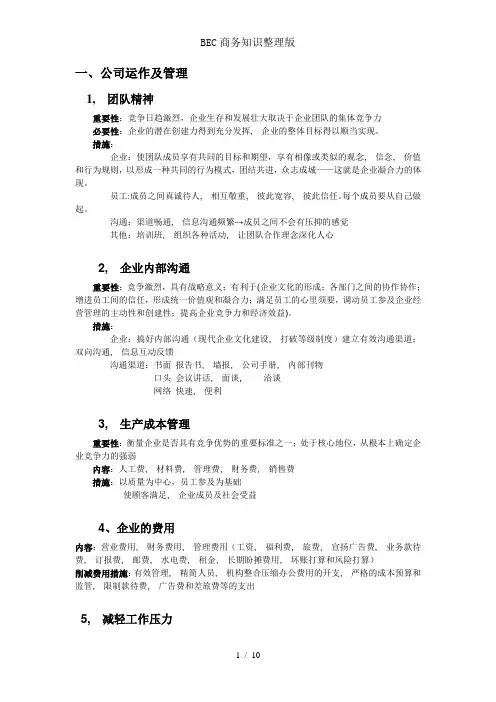
一、公司运作及管理1, 团队精神重要性:竞争日趋激烈,企业生存和发展壮大取决于企业团队的集体竞争力必要性:企业的潜在创建力得到充分发挥, 企业的整体目标得以顺当实现。
措施:企业:使团队成员享有共同的目标和期望,享有相像或类似的观念, 信念, 价值和行为规则,以形成一种共同的行为模式,团结共进,众志成城——这就是企业凝合力的体现。
员工:成员之间真诚待人, 相互敬重, 彼此宽容, 彼此信任。
每个成员要从自己做起。
沟通:渠道畅通, 信息沟通频繁→成员之间不会有压抑的感觉其他:培训班, 组织各种活动, 让团队合作理念深化人心2, 企业内部沟通重要性:竞争激烈,具有战略意义;有利于(企业文化的形成;各部门之间的协作协作;增进员工间的信任,形成统一价值观和凝合力;满足员工的心里须要,调动员工参及企业经营管理的主动性和创建性;提高企业竞争力和经济效益)。
措施:企业:搞好内部沟通(现代企业文化建设, 打破等级制度)建立有效沟通渠道;双向沟通, 信息互动反馈沟通渠道:书面报告书, 墙报, 公司手册, 内部刊物口头会议讲话, 面谈, 洽谈网络快速, 便利3, 生产成本管理重要性:衡量企业是否具有竞争优势的重要标准之一;处于核心地位,从根本上确定企业竞争力的强弱内容:人工费, 材料费, 管理费, 财务费, 销售费措施:以质量为中心,员工参及为基础使顾客满足, 企业成员及社会受益4、企业的费用内容:营业费用, 财务费用, 管理费用(工资, 福利费, 旅费, 宣扬广告费, 业务款待费, 订报费, 邮费, 水电费, 租金, 长期盼摊费用, 坏账打算和风险打算)削减费用措施:有效管理, 精简人员, 机构整合压缩办公费用的开支, 严格的成本预算和监管, 限制款待费, 广告费和差旅费等的支出5, 减轻工作压力必要性:现代生活节奏不断加快,企业运作竞争日益激烈,从业人员终日劳碌面对种种压力(工作繁重, 上班时间延长, 岗位竞争激烈, 工作平安感下降)导致:员工身心损害,不利于企业经营发展,影响员工队伍稳定性员工流失频繁,损害员工创建力,直接减弱企业的竞争实力。
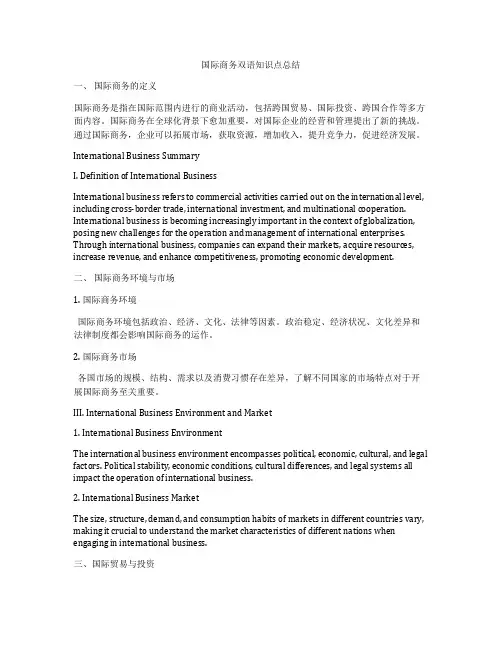
国际商务双语知识点总结一、国际商务的定义国际商务是指在国际范围内进行的商业活动,包括跨国贸易、国际投资、跨国合作等多方面内容。
国际商务在全球化背景下愈加重要,对国际企业的经营和管理提出了新的挑战。
通过国际商务,企业可以拓展市场,获取资源,增加收入,提升竞争力,促进经济发展。
International Business SummaryI. Definition of International BusinessInternational business refers to commercial activities carried out on the international level, including cross-border trade, international investment, and multinational cooperation. International business is becoming increasingly important in the context of globalization, posing new challenges for the operation and management of international enterprises. Through international business, companies can expand their markets, acquire resources, increase revenue, and enhance competitiveness, promoting economic development.二、国际商务环境与市场1. 国际商务环境国际商务环境包括政治、经济、文化、法律等因素。
政治稳定、经济状况、文化差异和法律制度都会影响国际商务的运作。
2. 国际商务市场各国市场的规模、结构、需求以及消费习惯存在差异,了解不同国家的市场特点对于开展国际商务至关重要。
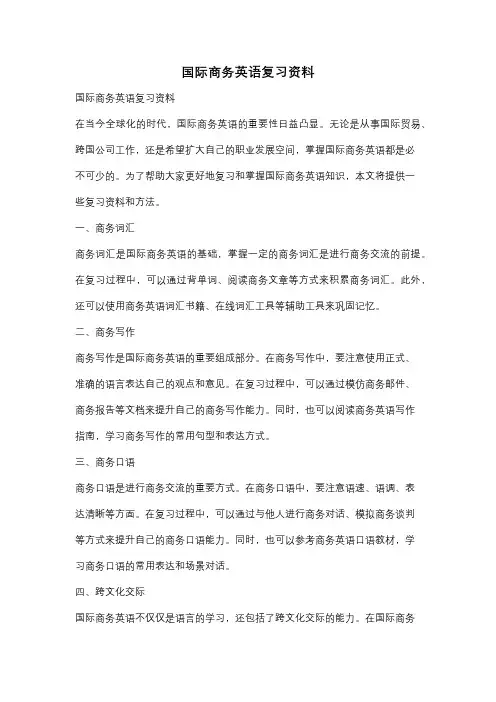
国际商务英语复习资料国际商务英语复习资料在当今全球化的时代,国际商务英语的重要性日益凸显。
无论是从事国际贸易、跨国公司工作,还是希望扩大自己的职业发展空间,掌握国际商务英语都是必不可少的。
为了帮助大家更好地复习和掌握国际商务英语知识,本文将提供一些复习资料和方法。
一、商务词汇商务词汇是国际商务英语的基础,掌握一定的商务词汇是进行商务交流的前提。
在复习过程中,可以通过背单词、阅读商务文章等方式来积累商务词汇。
此外,还可以使用商务英语词汇书籍、在线词汇工具等辅助工具来巩固记忆。
二、商务写作商务写作是国际商务英语的重要组成部分。
在商务写作中,要注意使用正式、准确的语言表达自己的观点和意见。
在复习过程中,可以通过模仿商务邮件、商务报告等文档来提升自己的商务写作能力。
同时,也可以阅读商务英语写作指南,学习商务写作的常用句型和表达方式。
三、商务口语商务口语是进行商务交流的重要方式。
在商务口语中,要注意语速、语调、表达清晰等方面。
在复习过程中,可以通过与他人进行商务对话、模拟商务谈判等方式来提升自己的商务口语能力。
同时,也可以参考商务英语口语教材,学习商务口语的常用表达和场景对话。
四、跨文化交际国际商务英语不仅仅是语言的学习,还包括了跨文化交际的能力。
在国际商务交流中,不同的文化背景和价值观会对商务活动产生影响。
在复习过程中,可以通过学习不同国家的商务礼仪、文化差异等来提升自己的跨文化交际能力。
同时,也可以参加国际商务交流活动,与外国商务人士进行交流,亲身感受跨文化交际的挑战和机遇。
五、实践应用复习国际商务英语不仅仅是理论的学习,更重要的是能够将所学知识应用到实践中。
在复习过程中,可以通过参加商务英语角、进行商务模拟演练等方式来锻炼自己的实践应用能力。
同时,也可以参与国际商务项目、实习等机会,将所学知识运用到实际工作中,提升自己的实际操作能力。
总结起来,国际商务英语的复习资料包括商务词汇、商务写作、商务口语、跨文化交际等方面。
国际商法知识点总结英文Key Knowledge Points in International Commercial Law1. Principles of International Commercial ContractsInternational commercial contracts are the backbone of global trade. Understanding the principles of contract law is crucial for companies engaged in international business. The key elements of a valid contract include offer, acceptance, consideration, intention to create legal relations, and certainty of terms. In the international context, parties may encounter issues such as choice of law, jurisdiction, and the enforceability of contracts across borders.2. The United Nations Convention on Contracts for the International Sale of Goods (CISG)The CISG is the most widely adopted international treaty for the sale of goods. It provides a uniform set of rules for contracts for the international sale of goods and governs the rights and obligations of both buyers and sellers. Understanding the provisions of the CISG, such as the obligations of the parties, the determination of the contract price, and the remedies for breach of contract, is essential for businesses engaged in international trade.3. International Trade LawInternational trade law encompasses the rules and regulations that govern the exchange of goods and services across national borders. It covers areas such as import and export regulations, tariffs, customs duties, and trade agreements. Businesses need to be aware of the legal framework governing international trade to ensure compliance and mitigate risks.4. IncotermsIncoterms are internationally recognized terms that define the responsibilities of buyers and sellers in international trade transactions. They provide a set of standard rules for the interpretation of trade terms, such as delivery, transport, insurance, and risk allocation. Understanding the different Incoterms is essential for negotiating and drafting international commercial contracts.5. International Dispute ResolutionDisputes are inevitable in international commercial transactions. Understanding the various methods of international dispute resolution, such as litigation, arbitration, and mediation, is crucial for businesses engaged in cross-border trade. Each method has its advantages and disadvantages, and the choice of dispute resolution mechanism should be carefully considered based on the specific circumstances of the dispute.6. Intellectual Property Rights in International BusinessIntellectual property (IP) rights play a crucial role in international business, as they protect the creations of the mind, such as inventions, trademarks, and copyrights. Understandingthe principles of IP law and the international treaties and conventions that govern IP rights is essential for businesses engaged in cross-border trade, as it helps protect their intangible assets from infringement and unauthorized use.7. Cross-Border Mergers and AcquisitionsInternational mergers and acquisitions involve complex legal issues related to corporate law, antitrust law, and regulatory compliance. Understanding the legal framework governing cross-border M&A transactions, including the due diligence process, merger control regulations, and the negotiation and drafting of acquisition agreements, is essential for companies seeking to expand their global footprint through M&A activities.8. Compliance with International Regulations and StandardsInternational businesses need to comply with a myriad of regulations and standards, including those related to product safety, environmental protection, anti-corruption, and data privacy. Understanding the legal requirements and best practices for compliance in different jurisdictions is essential for maintaining the reputation and sustainability of the business.9. International Commercial ArbitrationArbitration is a widely used method for the resolution of international commercial disputes. Understanding the principles of international arbitration, including the selection of arbitration rules, the appointment of arbitrators, the conduct of arbitral proceedings, and the enforcement of arbitral awards, is essential for businesses engaged in cross-border transactions.10. Legal and Ethical Issues in International BusinessOperating in the global marketplace raises various legal and ethical challenges for businesses, such as bribery and corruption, human rights violations, and supply chain management. Understanding the legal and ethical issues in international business is crucial for companies to navigate the complex landscape of global trade while upholding ethical standards and corporate social responsibility.In conclusion, international commercial law is a vast and complex field that requires a deep understanding of legal principles, regulations, and customs that govern cross-border transactions. Businesses operating in the global marketplace need to be aware of the key knowledge points in international commercial law to ensure compliance, mitigate risks, and seize opportunities in the global economy.。
国际商务英语学科考试复习要点Lesson 1 International Business商务术语:FDI GDP BOT patent copyright value chain franchising (紫色书10-11页)考点:国际商务贸易的主要类型(major types of international business)A.Trade(贸易):a. commodity trade (商品贸易,也叫有形贸易visible trade )b. trade (服务贸易, 也叫无形贸易invisible trade)B. Investment (投资): a. foreign direct investment (FDI 外国直接投资)b. portfolio investment (证券投资)C. Other types (其他类型): a. licensing and franchising (国际许可与特许经营)b. management contract and contract manufacturing (管理合同和承包生产)翻译练习:1.随着经济全球化的发展,无形贸易即使在发展中国家的国际贸易中所占的比例也逐渐增大With the development of economic globalization, invisible trade accounts for an increasing proportion of the world trade even in the developing countries2.BOT是“交钥匙”工程的一种流行的变通形式BOT is a popular variant of the turnkey projectLesson 2 Income Level and the World Market商务术语:GNP PPP ( purchasing power parity 购买力平价) Staple goods (大路货)creditor country ( 债权国) (紫色书25页)考点:国民生产总值和国生产总值(GNP 和GDP)GNP: refers to the market value of goods ands produced by the property and labor owned by the residents of an economyGDP:refers to the market value of all goods ands produced within the geographic area of an economy.Per capita income (人均收入): It is calculated by dividing its national income by its population Triad and Quad (三方组合和四方组合): A. United StatesB. Western EuropeC. JapanD. Canada翻译练习:1.国民生产总值和国生产总值体现了一个国家的全部收入,在衡量国民收入方面可以互换使用。
国际商务英语考试商务知识必备知识点一、国际贸易基础知识国际贸易的定义:国际贸易是指不同国家、不同地区之间进行商品、服务和资本的交换和流通的经济活动。
国际贸易的形式:主要包括货物贸易、服务贸易和资本贸易。
国际贸易的参与主体:包括出口商、进口商、运输公司、报关行等。
二、国际支付与结算国际贸易中的支付方式:包括现金支付、信用证支付、托收支付、跨境电子支付等。
国际结算的方式:主要有电汇、信汇、票汇和汇票等。
国际贸易的结算货币:通常是以美元为主要结算货币,也有部分以欧元、人民币等其他货币结算。
三、国际物流与运输国际物流的定义:是指货物从生产地到销售地的整个运输和仓储环节。
国际物流的主要环节:包括采购物流、生产物流、销售物流和售后物流等。
国际运输方式:包括海运、空运、陆运和铁路运输等。
四、国际市场开拓与营销国际市场开拓的步骤:包括市场分析、目标市场选择、市场定位和市场推广等。
国际市场营销的策略:包括产品策略、价格策略、渠道策略和促销策略等。
五、国际贸易法律法规国际贸易的法律法规:包括WTO框架下的《关税及贸易总协定》(GATT),《国际货物销售合同公约》(CISG)等。
国际贸易合同的要素:合同主体、货物描述、价格条款、交货方式和付款方式等。
国际贸易纠纷解决方式:包括商业仲裁、诉讼和调解等。
六、国际商务礼仪与文化国际商务礼仪的重要性:在国际商务交往中,合适的商务礼仪能够提升商务合作的效果和信任度。
国际商务文化的差异:不同国家和地区的商务文化存在差异,了解并尊重对方的商务文化是成功经营国际业务的重要因素。
七、国际商务风险管理国际贸易的风险:包括汇率风险、物流风险、贸易壁垒和政治风险等。
国际商务风险管理的措施:包括货物保险、贸易融资、风险评估和合同管理等。
总结:以上所述为国际商务英语考试商务知识必备的知识点,深入了解和掌握这些知识对于成功应对国际商务考试和实际商务操作具有重要意义。
希望本文所提供的知识点对您有所帮助。
国际商务英语学科考试复习要点Lesson 1 International Business商务术语:FDI GDP BOT patent copyright value chain franchising (紫色书10-11页)考点:国际商务贸易的主要类型(major types of international business)A.Trade(贸易):a. commodity trade (商品贸易,也叫有形贸易visible trade )b. service trade (服务贸易, 也叫无形贸易invisible trade)B. Investment (投资): a. foreign direct investment (FDI 外国直接投资)b. portfolio investment (证券投资)C. Other types (其他类型): a. licensing and franchising (国际许可与特许经营)b. management contract and contract manufacturing (管理合同和承包生产)翻译练习:1. 随着经济全球化的发展,无形贸易即使在发展中国家的国际贸易中所占的比例也逐渐增大With the development of economic globalization, invisible trade accounts for an increasing proportion of the world trade even in the developing countries2. BOT是“交钥匙”工程的一种流行的变通形式BOT is a popular variant of the turnkey projectLesson 2 Income Level and the World Market商务术语:GNP PPP ( purchasing power parity 购买力平价) Staple goods (大路货)creditor country ( 债权国) (紫色书25页)考点:国民生产总值和国内生产总值(GNP 和GDP)GNP: refers to the market value of goods and services produced by the property and labor owned by the residents of an economyGDP: refers to the market value of all goods and services produced within the geographic area of an economy.Per capita income (人均收入): It is calculated by dividing its national income by its population Triad and Quad (三方组合和四方组合): A. United StatesB. Western EuropeC. JapanD. Canada翻译练习:1. 国民生产总值和国内生产总值体现了一个国家的全部收入,在衡量国民收入方面可以互换使用。
常用的国际商务知识点在如今这个全球化的时代,国际商务变得越来越重要。
咱就说,哪怕是个小公司,也有可能跟国外的合作伙伴打交道。
这国际商务的知识啊,那可真是多如牛毛,不过有几个常用的点,还真挺有意思。
先来说说国际贸易术语吧。
就比如说 FOB ( Free on Board ),这可不光是几个字母的组合,背后那是一整套的责任和费用划分规则。
我之前在一家贸易公司实习的时候,就碰到过这么一档子事儿。
我们公司要从国外进口一批货物,对方给的报价是 FOB 价。
当时我还不太懂这意味着啥,只知道是个贸易术语。
结果在实际操作中,问题来了。
按照 FOB 的规定,货物在装上船之前的所有费用和风险都由卖方承担,而装船之后的费用和风险就归我们买方了。
可问题是,我们找的货代和船运公司衔接出了问题,导致货物在港口多停留了几天,产生了额外的仓储费用。
这时候,对方就说按照 FOB 条款,这费用得我们自己出。
我当时那个着急啊,心想这可咋办。
赶紧去查各种资料,跟对方沟通协商。
最后,经过一番艰苦的谈判,双方各承担了一部分费用,这事儿才算是解决了。
通过这件事儿,我算是深刻理解了国际贸易术语的重要性,一个小小的术语,能牵扯出这么多的费用和责任问题。
再讲讲汇率吧。
这汇率的波动,那可真是让人又爱又恨。
有一次,我们公司跟一个欧洲的客户签了一笔大订单,合同都签好了,就等着发货收款。
结果那段时间,欧元汇率大幅下跌。
这可把我们老板急坏了,天天盯着汇率走势,嘴里不停地念叨着:“这可咋办,这可咋办。
”原本能赚不少的一笔生意,因为汇率的变动,利润大幅缩水。
从那以后,我们公司在签订国际合同的时候,都会更加谨慎地考虑汇率风险,要么在合同中加入汇率保护条款,要么通过套期保值等金融工具来降低风险。
还有文化差异这个事儿,在国际商务中可太重要了。
我记得有一次参加一个国际商务会议,来自不同国家的代表都聚在一起。
在会议休息期间,我们准备了一些小吃和饮料。
其中有一款点心是我们当地的特色,味道有点特别。
祝您学业、事业成功!《国际商务英语》复习资料Lesson 1♦In compliance with: in conformity to♦For short: in abbreviation♦Portfolio (n.): securities♦Franchise (vt.): authorize the privilege to sb.♦Lease (vt. / n.): rent ~ sth. to sb.house ~, long-term ~♦Royalty (n.): a share in the profit made from intellectual property♦Advisable (adj.): proper, good, wise-- It’s not ~ to make him angry.♦Access to sth.: the right to use sth.have / gain ~ to sth.-- Only staffs have access to the backstage.♦Participate (vi.): attend, take part in~ in some activity♦Flat (adj.): fixed~ rate♦Bonus (n.): additional payment 补助,津贴,分红,奖金♦Expertise (n.): expert advice, profession skills♦Give rise to: cause♦Cost plus: additional fee to the cost♦Variant (n. / adj.): changed factor, differentLesson 2♦Assess (vt.): estimate the value♦Clue (n.): tip to find out the solution♦dividend (n.): share, surplus, bonus♦distort (vt.): twist♦parity (n.): equation♦tap (vt.): develop♦bear sth. in mind: keep thinking of sth.♦haven (n.): safe place, harbor♦populous (adj.): having a large population♦diversify (vt.): make sth. various♦spur (vt.): stimulate♦complementary (adj.): forming as a whole♦suffice (vi.): be able-- The food can suffice till next week.♦proximity (n.): closeness~ to sth.♦observations (n.): result, opinions from observingLesson 3●Witness (vt. / n.): testify 见证,目击●Liberal + ize (vt.): make sth. free 自由化●Fall under: be classified as 归类为●Detour (n.): a temporary route instead of main route 绕路,迂回●Adoption (n.): accepting 采用,采纳●Erode (vt.): wear away 腐蚀●Autonomy (n.): self-governing 自治⏹Autonomous region●sovereign state: independent country 主权国家●political entity: 政治实体●set the stage for: provide basis for 为。
International Business EnglishLesson 1International BusinessBusiness Knowledge:The major differences between international business and domestic businessA. Differences in legal systemsB. Differences in currenciesC. Differences in cultural backgroundD.DifferentinnaturalandeconomicconditionsThe major types of international businessA. Trademodity tradeb.Service tradeB. Investmenta.Foreign direct investmentb. Portfolio investmentC. Other typesa.Licensing and franchisingb.Management contract and contract manufacturingc. Turnkey project and BOTAnswer the following questions:1.Whatdoesinternationalbusinessreferto?Pleasetellthedifferencebetweeninternationalbusinessanddo mestic business.A:Internationalbusinessreferstotransactionbetweenpartiesfromdifferentcountries.Sometimes businessacrossthebordersofdifferentcustomsareasofthesamecountryis alsoregardedasimportandexport.Some major differences between international business and domesticbusiness is following:(1)Differences in legal systems(2)Differences in currencies(3)Differences in cultural background(4)Different in natural and economic conditions2.Pleaseexplainthedifferencesbetweenvisibletradeandinvisibletrade.Whichisbecomingmoreandmore important andaccounts for anincreasingproportionininternationaltrade?A:Visibletradeistheformofcommoditytrade.Theformoftransportation,communication,banking,insur ance,consulting,informationetc.iscalledinvisibletradeorserviceindustries.Thelater is becomemore andmoreimportant.3.Canyoucitesomeexamplestoillustrateculturaldifferencesininternationalbusiness?A:Culturaldifferencesincludinglanguage,customs,traditions,religion,value,behavioretc.4.Please elaborate on the two categories of international investment. What is their major difference?A:FDI(Foreigndirectinvestment)ismadeforreturnsthroughcontrollingtheenterprisesorassetsinvestedi ninahostcountry.Portfolioinvestmentreferstopurchasesof foreignfinancialassetsfora purposeotherth ancontrolling.Suchfinancialassetsmaybe stocks,bonds orcertificatesofdeposit.5.Whatislicensing?Whydo firmssometimes choose it as a means ofenteringaforeign market?A:Inlicensing,afirmleasestherighttouseitsintellectualpropertytoafirminanothercountry.Theychooselic ensingbecausetheydonothavetomakecashpaymentstostatbusiness,andcansimplyreceiveincomeinthef ormofroyalty.Besides,they can benefit fromlocationaladvantagesofforeignoperationwithoutanyobligationsinownershipormanagement.The useoflicensingisparticularlyencouragedby highcustomsdutyandnon-tariffbarriersonthe partofthe hos t country.6.What is franchising? How is it different from licensing?A:Underfranchising,franchiseeisallowedtooperateinthenameofanother,franchiserwhoprovidesthe formerwithtrademarks,brandnames,logosandoperatingtechniq uesforroyalty.Incomparisonwiththerelationbetweenthelicenserandthelicensee,thefranchiserhasmore controloverand providesmoresupport for the franchisee.7.What is a management contract? Under what conditions is it most applicable?A:Underamanagementcontract,onecompanyoffersmanagerialorotherspecializedservicestoanotherwi thinaparticularperiodforaflatpaymentorapercentageoftherelevantbusinessvolume.Whenagovernmen tforbidsforeignownershipincertainindustriesitconsiderstobeofstrategic importance but lacks the expertise for operation, management contracts maybe a practical choice enabling a foreign company to operate in the industry without owning the assets.8.What is an international turnkey project? In what way is its variant BOT different from it?A:Foraninternationalturnkeyproject,afirmsignsacontractwithaforeignpurchaserandundertakesallthed esigning,contractingandfacilityequippingbeforehandingitovertothelatterupon completion.ForaBOT project, a firm operates a facility for a period of time after building it up before finally transferring it to a foreign company. Making profit from operating the project for aperiodisthemajordifferencebetweenBOTandthecommonturnkeyprojectTranslate the following sentences into English:1.国际贸易一般指不同国家的当事人进行的交易,它涉及到许多因素,因而比国内贸易要复杂得多。
Internationalbusinessreferstotransactionbetweenpartiesformdifferentcountries.Itinvolvesmorefacto rsandthusismorecomplicatedthedomestic business.2.随着经济一体化进程的发展,很少人和公司能完全独立于国际商务之外而存在。
因此,在此方面具有一定的知识是十分必要的,这既有益于企业的发展又有益于个人的进步。
Withthedevelopmentofeconomicglobalization,fewpeopleorcompaniescancompletelystayawayfromi nternationalbusiness.Therefore,someknowledgeinthisrespectisnecessarybothforthebenefitofenterpri sesandpersonaladvancement.3.其他参与国际贸易的形式有管理合同、承包生产和“交钥匙”工程。